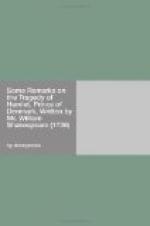Page 238.
We’ll teach you to drink deep, e’er you depart.
This seems designed to reflect upon the sottish Disposition, then encouraged amongst the Danes by the Usurper, as will appear in the Sequel; and gives us one Reason why Elsinoor was disagreeable to Prince Hamlet; and certainly, much confirms what I before said, as to his going back to Wittenberg.
Page 238.
The Prince’s Reflections on his Mother’s hasty Marriage, are very natural, and shew That to be one of the principal Causes of the deep fix’d Concern so visible in his Behaviour; and then they serve to introduce the Relation of the Appearance of his Father’s Ghost.
Page 238, to the End of the Scene.
Hamlet receives the Account they give him with such a Surprize as is very natural, and particularly his breaking off from the Consequence of his Question, viz. Hold you the Watch to Night? and saying arm’d? that is, returning to the main Question, is exceedingly in Nature.
Their differing in the Account of the Time the Spectre staid, throws an Air of Probability on the Whole, which is much easier felt than described.
The Prince’s Resolution to speak to the Phantom, let what will be the Consequence, is entirely suitable to his Heroical Disposition; and his Reflection upon his Father’s Spirit appearing in Arms, is such as one would naturally expect from him; and the Moral Sentence he ends his short Speech with, suits his virtuous Temper, at the same Time that it has a good Effect upon the Audience, and answers the End of Tragedy.
Page 241, to the End of the Scene, in p. 246.
SCENE in Polonius’s House.
Enter Laertes and Ophelia, and afterwards Polonius.
It is evident by the whole Tenour of Polonius’s Behaviour in this Play, that he is intended to represent some Buffoonish Statesman, not too much fraught with Honesty. Whether any particular Person’s Character was herein aim’d at, I shall not determine, because it is not to the Purpose; for whoever reads our Author’s Plays, will find that in all of them, (even the most serious ones) he has some regard for the meanest Part of his Audience, and perhaps too, for that Taste for low Jokes and Punns, which prevailed in his Time among the better Sort. This, I think, was more pardonable in him, when it was confined to Clowns, and such like Persons in his Plays; but is by no Means excusable in a Man, supposed to be in such a Station as Polonius is, Nay, granting that such Ministers of State were common, (which surely they are not) it would even then be a Fault in our Author to introduce them in such Pieces as this; for every Thing that is natural is not to be made use of improperly: But when it is out of Nature, this certainly much aggravates the Poet’s Mistake. And, to speak Truth, all Comick Circumstances, all




